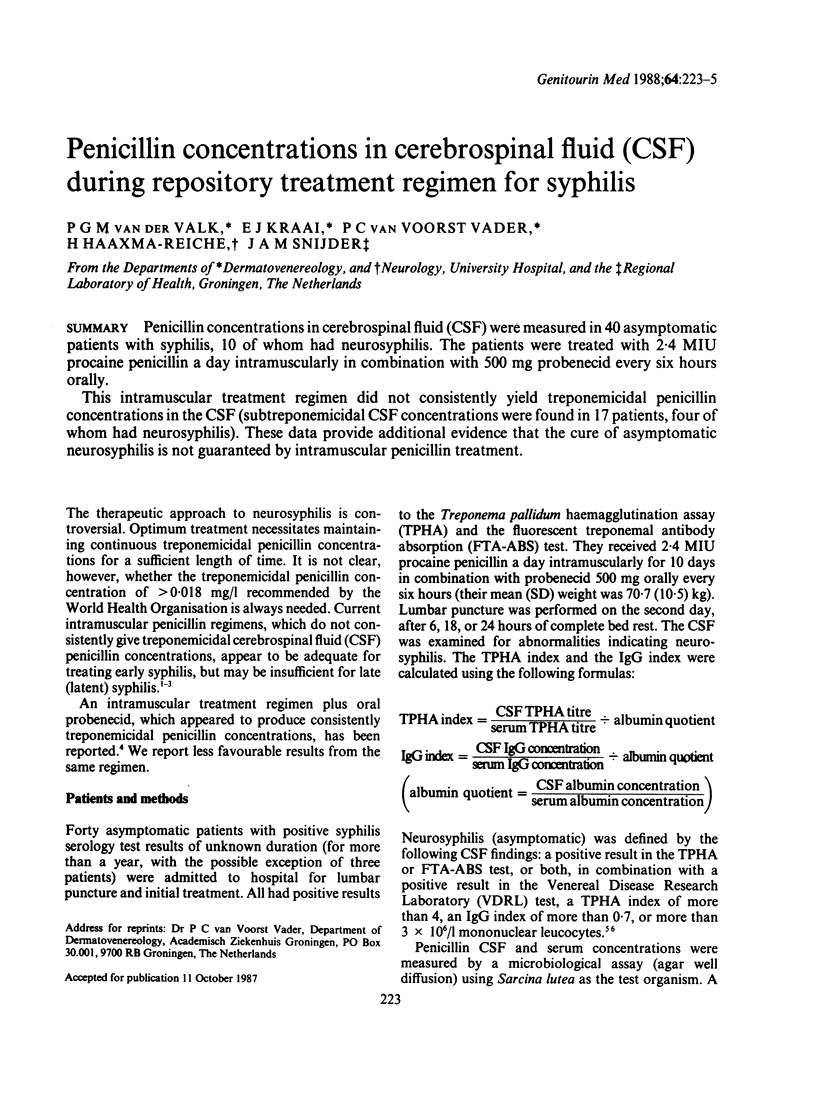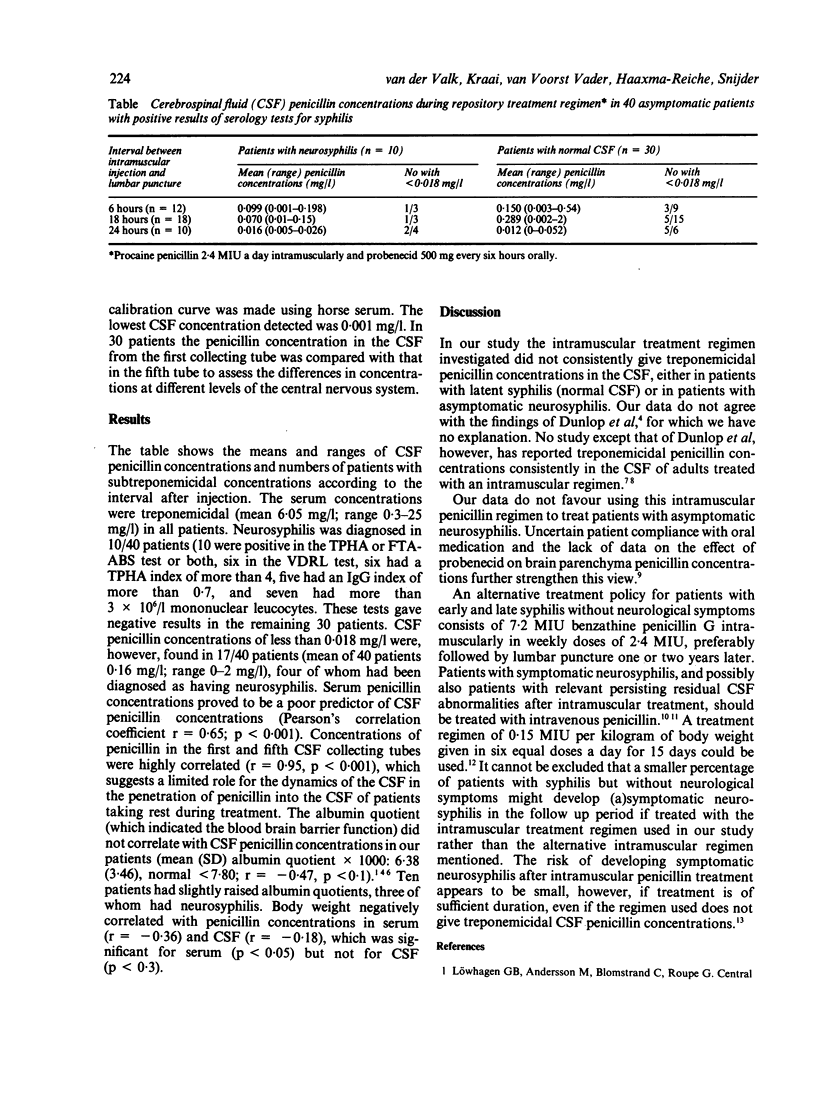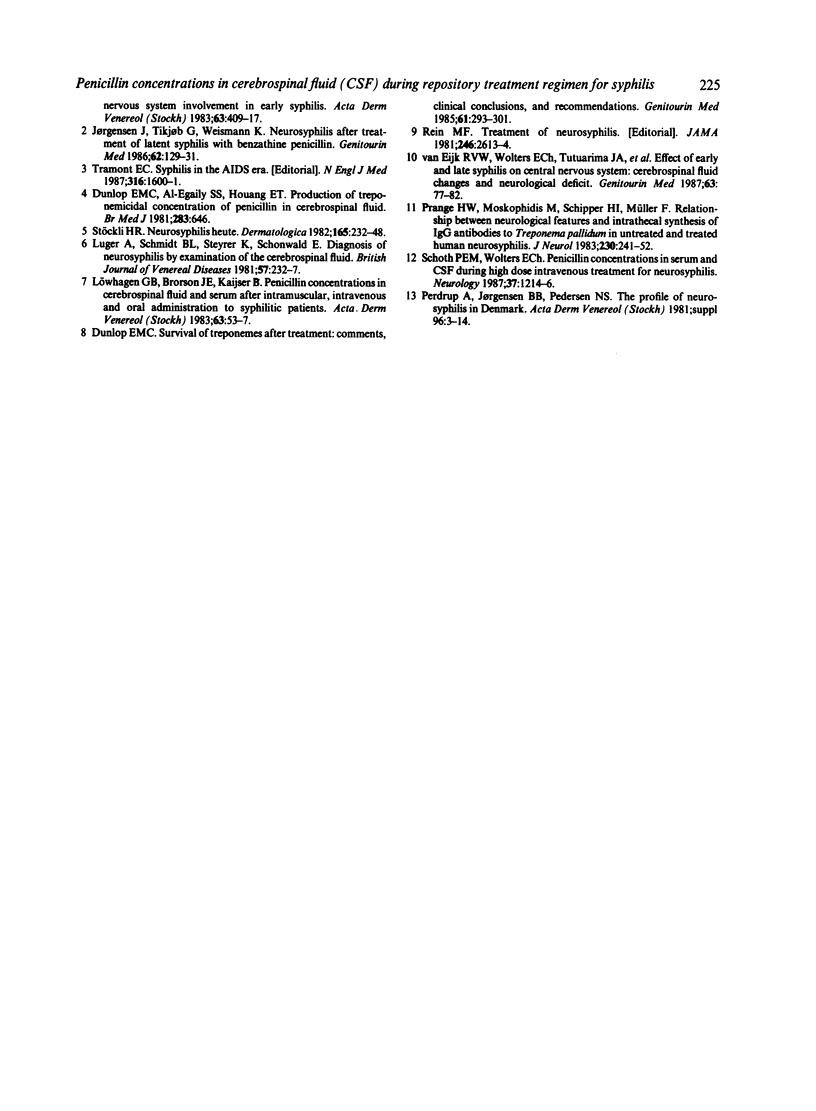Abstract
Penicillin concentrations in cerebrospinal fluid (CSF) were measured in 40 asymptomatic patients with syphilis, 10 of whom had neurosyphilis. The patients were treated with 2.4 MIU procaine penicillin a day intramuscularly in combination with 500 mg probenecid every six hours orally. This intramuscular treatment regimen did not consistently yield treponemicidal penicillin concentrations in the CSF (subtreponemicidal CSF concentrations were found in 17 patients, four of whom had neurosyphilis). These data provide additional evidence that the cure of asymptomatic neurosyphilis is not guaranteed by intramuscular penicillin treatment.
Full text
PDF


Selected References
These references are in PubMed. This may not be the complete list of references from this article.
- Dunlop E. M., Al-Egaily S. S., Houang E. T. Production of treponemicidal concentration of penicillin in cerebrospinal fluid. Br Med J (Clin Res Ed) 1981 Sep 5;283(6292):646–646. doi: 10.1136/bmj.283.6292.646. [DOI] [PMC free article] [PubMed] [Google Scholar]
- Dunlop E. M. Survival of treponemes after treatment: comments, clinical conclusions, and recommendations. Genitourin Med. 1985 Oct;61(5):293–301. doi: 10.1136/sti.61.5.293. [DOI] [PMC free article] [PubMed] [Google Scholar]
- Jørgensen J., Tikjøb G., Weismann K. Neurosyphilis after treatment of latent syphilis with benzathine penicillin. Genitourin Med. 1986 Apr;62(2):129–131. doi: 10.1136/sti.62.2.129. [DOI] [PMC free article] [PubMed] [Google Scholar]
- Luger A., Schmidt B. L., Steyrer K., Schonwald E. Diagnosis of neurosyphilis by examination of the cerebrospinal fluid. Br J Vener Dis. 1981 Aug;57(4):232–237. doi: 10.1136/sti.57.4.232. [DOI] [PMC free article] [PubMed] [Google Scholar]
- Löwhagen G. B., Andersson M., Blomstrand C., Roupe G. Central nervous system involvement in early syphilis. Part 1. Intrathecal immunoglobulin production. Acta Derm Venereol. 1983;63(5):409–417. [PubMed] [Google Scholar]
- Löwhagen G. B., Brorson J. E., Kaijser B. Penicillin concentrations in cerebrospinal fluid and serum after intramuscular, intravenous, and oral administration to syphilitic patients. Acta Derm Venereol. 1983;63(1):53–57. [PubMed] [Google Scholar]
- Prange H. W., Moskophidis M., Schipper H. I., Müller F. Relationship between neurological features and intrathecal synthesis of IgG antibodies to Treponema pallidum in untreated and treated human neurosyphilis. J Neurol. 1983;230(4):241–252. doi: 10.1007/BF00313700. [DOI] [PubMed] [Google Scholar]
- Schoth P. E., Wolters E. C. Penicillin concentrations in serum and CSF during high-dose intravenous treatment for neurosyphilis. Neurology. 1987 Jul;37(7):1214–1216. doi: 10.1212/wnl.37.7.1214. [DOI] [PubMed] [Google Scholar]
- Tramont E. C. Syphilis in the AIDS era. N Engl J Med. 1987 Jun 18;316(25):1600–1601. doi: 10.1056/NEJM198706183162510. [DOI] [PubMed] [Google Scholar]
- van Eijk R. V., Wolters E. C., Tutuarima J. A., Hische E. A., Bos J. D., van Trotsenburg L., de Koning G. A., van der Helm H. J. Effect of early and late syphilis on central nervous system: cerebrospinal fluid changes and neurological deficit. Genitourin Med. 1987 Apr;63(2):77–82. doi: 10.1136/sti.63.2.77. [DOI] [PMC free article] [PubMed] [Google Scholar]


